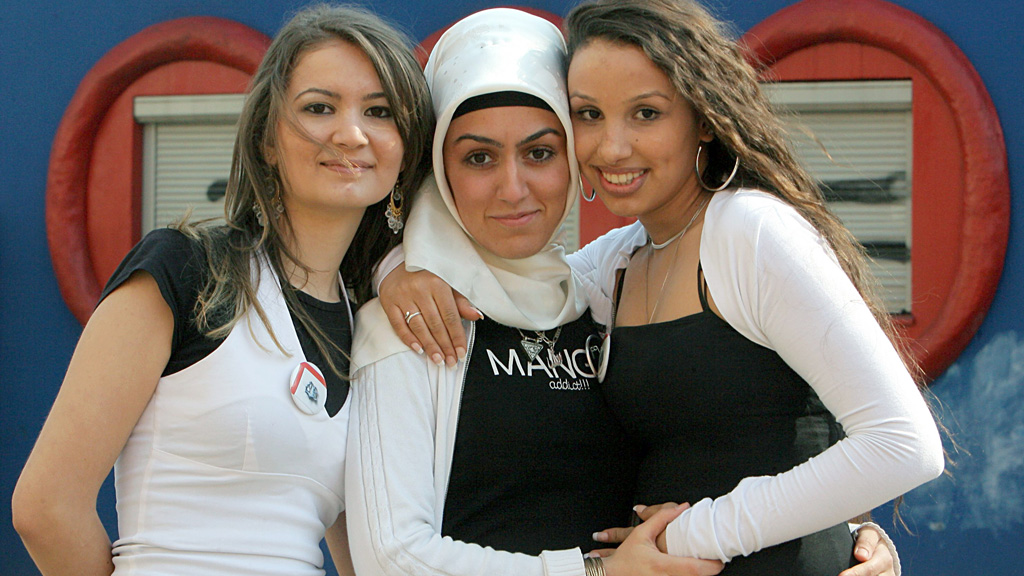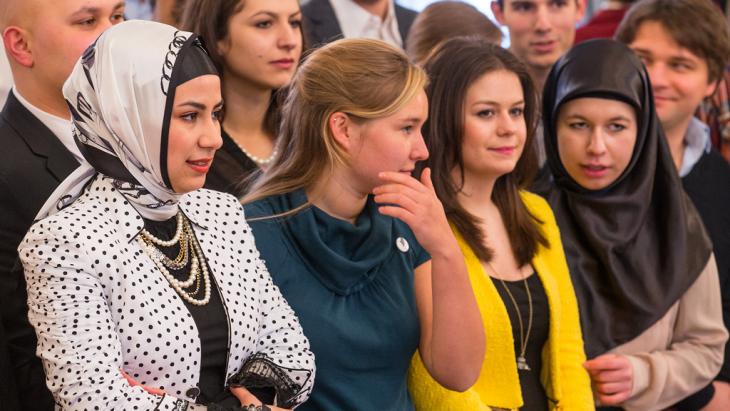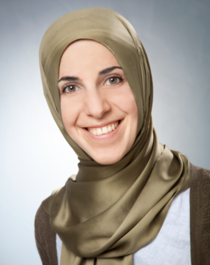Forget, but don't forget

While developing their identities during adolescence, young people are faced with the challenging task of finding their place as an individual and as part of society. They do so in particular by taking orientation from various social groups with which they identify and to which they feel a sense of belonging.
In this process, the scope of identification possibilities is influenced by social, societal, political, economic and cultural circumstantial factors. For example: family background, friends and acquaintances, schools, cliques, youth-cultural spheres such as the virtual world and the political climate all play a role.
Although all young people go through this process of finding their place in society, there are differences between various groups of young people. For example, as members of a minority, young Muslims generally have a different experience to young people who belong to the so-called "majority society".
Collective mistrust of German affiliation
One significant difference lies in the fact that the young Muslim's search for his/her place is perpetually scrutinised by society. This collective mistrust of young Muslims' affiliation to Germany reveals itself in various contexts and in various ways.
Consider, for example, the classic question concerning someone's ethnic background and family tree going back three generations. This question makes it clear that the person being questioned is perceived as being "non-German", which is after all why the questioner wants to know about his/her background. In addition, reduced opportunities on the jobs, education and training market – despite applicants having the same qualifications – also make it clear that young Muslims do not meet societal expectations of what constitutes being German.
Incidences of young Muslim women being rejected from gyms because of their headscarves are further evidence that they do not enjoy the same rights as their peers. The headscarf, which has mutated into a symbol of all that is different and alien, effectively denies them the right to lead a healthy and active lifestyle.

A lack of opportunities and participation
These and other examples from all areas of life make it clear that young Muslims are largely perceived by the majority society as different or as not belonging. The significance of this perception is revealed by the fact that this lack of societal acceptance of young Muslims as equal German citizens limits their perspectives and possibilities as they map out their lives.
But how can the collective acceptance of young Muslims as German citizens come about if this minority is permanently being categorised and construed linguistically, politically, economically and by the media as being different and not belonging?
In view of the complexity of the issue, a simple answer to this question and a straightforward solution are unlikely and would in any case be disproportionate. It is more likely that this process of acceptance could be nudged into gear by certain triggers.
Some key food for thought can be found in the work of the black US feminist Pat Parker, who describes this acceptance dilemma in her poem "For the White Person who wants to know how to be my friend":
"The first thing you do is to forget that I am Black.
Second, you must never forget that I am Black."
Forget that I am a Muslim
Parker makes two requests of the majority society. If we transpose the first to the situation of young Muslims, it would read as follows: forget that I am a Muslim. In other words: "Don't reduce me to my religious affiliation, which represents ONE aspect of my personality, because this one-sided focus obscures the view of my other traits and capabilities, and therefore of my multifaceted character, which I cannot then show as a result."
The fact that Fatma loves maths and performs well in science subjects, or that she is learning Chinese and likes to draw in her free time, remains just as much hidden as the fact that Hamza would like to be a primary school teacher because he has noticed the lack of male teaching staff at elementary level, and is active in schools on a voluntary basis.

If Fatma and Hamza are perceived "only" as Muslims and are pigeonholed, those they encounter will not do justice to their personalities and preferences, which would mean for example that they would receive little opportunity to exhibit their full potential at a job interview. Before Muslim religious affiliation can be "forgotten" and young Muslims perceived as equal German citizens, people must first be made aware of the constructive and reproductive mechanisms of this categorisation.
Politicians and the media also contribute to the perception that being a Muslim is the opposite of being German, and to the idea that the two are incompatible. This is also evident from the fact that Muslim life in Germany is perpetually being presented as problematic: mosques, headscarves, long beards, the circumcision of boys or other rituals are presented as brutal, dangerous, backward, repressive and uncivilised, and these issues are debated with generalising brushstrokes.
As long as these one-sided and distorted attributions by the majority society are presented under the cover of freedom of speech and the claim to represent truth and reality, the notion that being Muslim is the opposite of being German will remain omnipresent. And if this is going to be altered in any way, it will require an approach to identity that tolerates diverse ways of being German.
Never forget that I am a Muslim
If applied to the situation of young Muslims, Parker's second request levelled at the majority society would read as follows: never forget that I am a Muslim.
In other words: "Don't forget that I belong to a distinct minority, that my skin is a different colour and therefore, due to my minority status, I am exposed to societal discrimination and disadvantage."
The fact that despite her capabilities, Fatma will have difficulties on the jobs market because of her headscarf should not be forgotten. It should not be forgotten so that it becomes apparent that the exclusion is making itself felt structurally and politically. Until such time as societal disadvantages and structural mechanisms are addressed and laid bare, they will continue to have an impact – albeit inconspicuously in the background – and will, therefore, not be registered.
If young Muslims are going to become equal members of this society, linguistic, political and societal changes are necessary, as well as changes to the way discourse on the issue is conducted, which can only be effected by the majority society together with Muslim citizens.
Only when the fact of being Muslim becomes irrelevant to being German and to societal participation, and when comments on the identity of young Muslims become superfluous, will young Muslims be able to live as accepted and equal citizens in this society.
Melahat Kisi
© Qantara.de 2014
Translated from the German by Nina Coon
Editor: Aingeal Flanagan/Qantara.de
